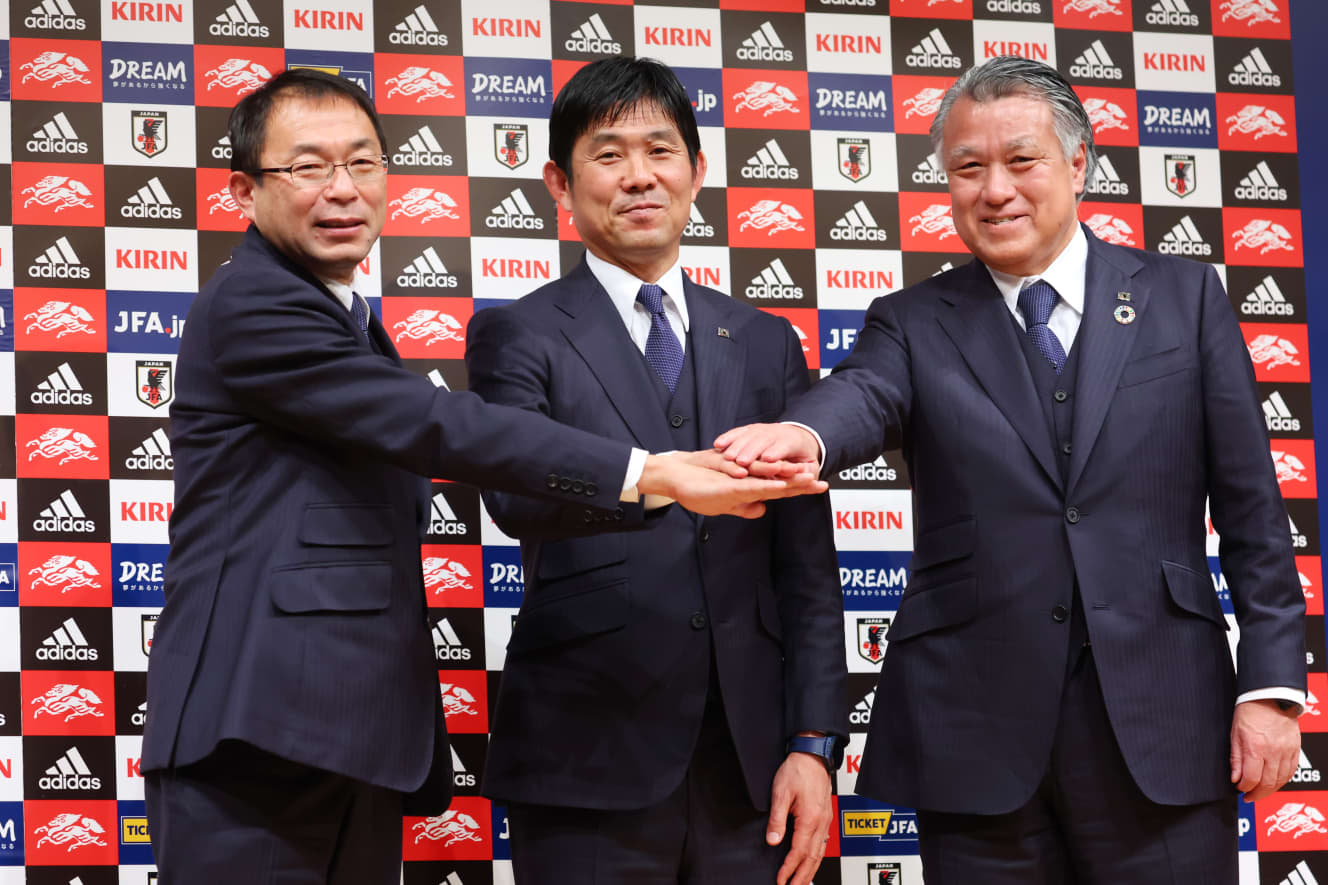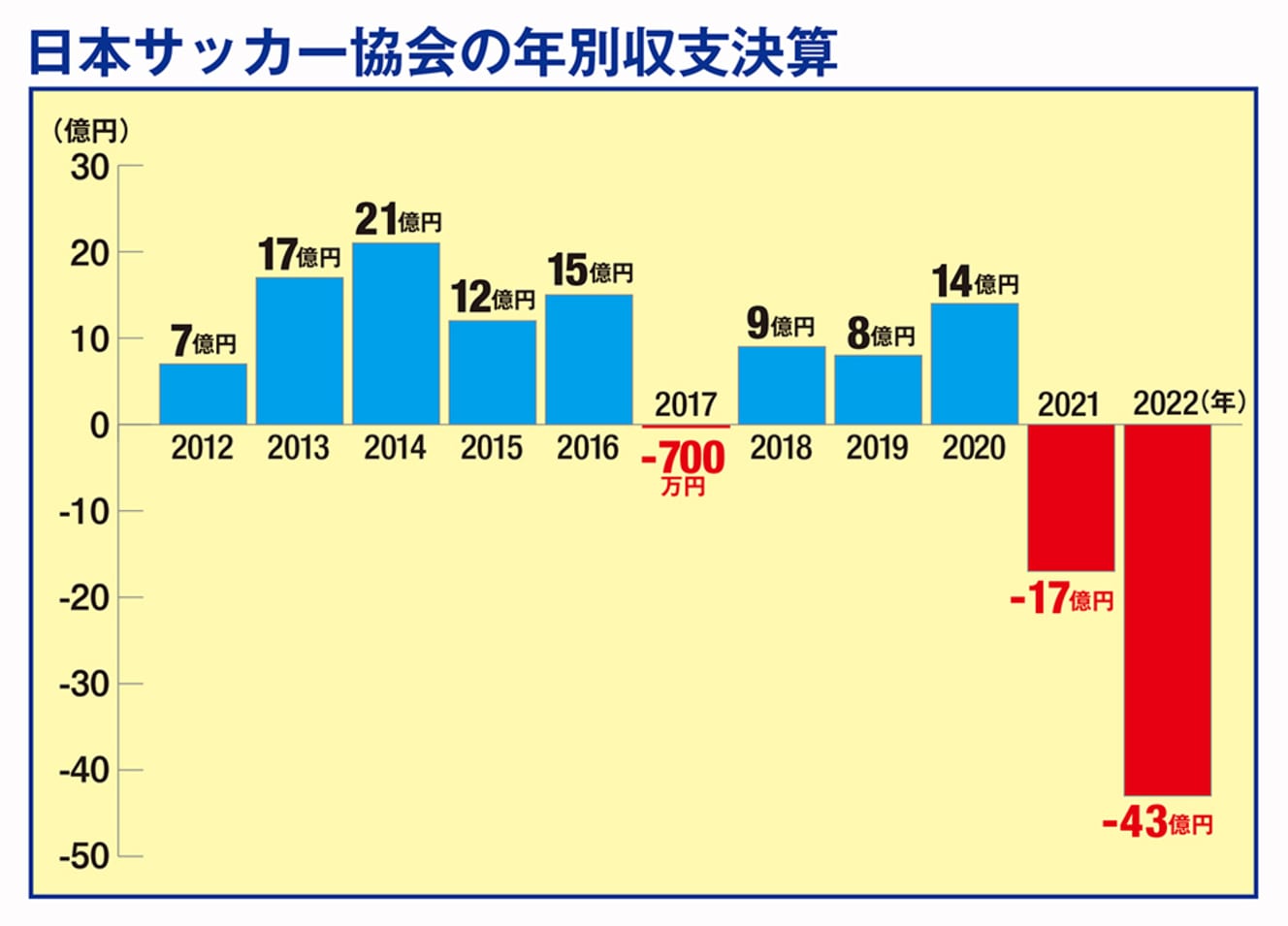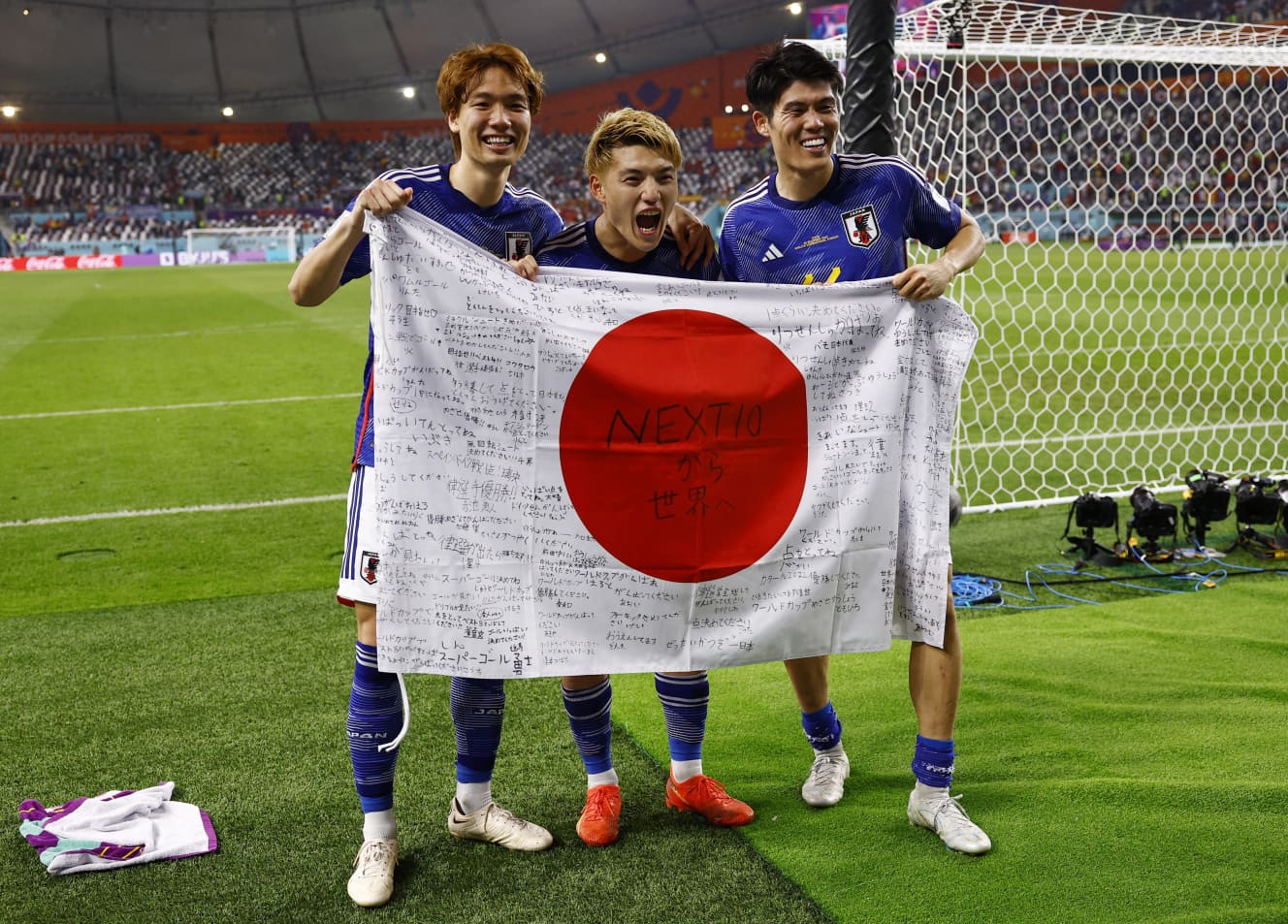All-Japanese Coach for the Second Moriyasu Japan: The Association Wanted to Bring Forward the Schedule to Continue the Coaching of Moriyasu’s Japan, “Due to the Wallet Situation

Less than three weeks after the World Cup in Qatar last year, Hajime Moriyasu was announced as the coach of the national team that defeated past champions Germany and Spain, and the Japan Football Association (JFA) re-signed him to a new four-year contract through the 2026 World Cup. The coaching staff is now all Japanese. In addition, the JFA received a bonus of about 2 billion yen from FIFA (Fédération Internationale de Football Association) for the World Cup, including the tournament preparation fee (about 200 million yen) and the prize money (about 1.768 billion yen) for the countries that made the last 16, making it appear that the JFA was financially well-off. However, the JFA had a “purse situation” that required Moriyasu to continue as coach.
As one sports newspaper desk clerk revealed, “The JFA had a ‘purse situation’ that required Moriyasu to stay on.
At the press conference held on December 28 last year, Kozo Tajima, who was standing next to Moriyasu, was smiling from start to finish, but in his true feelings, he was desperate to get Moriyasu to continue as coach. The press conference was originally scheduled to be held after the regular board meeting in late January, but it was moved up about three weeks to the end of the year on the last day of work,” he said.
Although Japan missed its goal of advancing to the last eight, the impact the national team left on the world by defeating past World Cup champions Germany and Spain was so strong that even after losing to Croatia in the first round of the final tournament on December 6, the JFA and Moriyasu’s side had reached a mutual agreement on the next coach of the national team. The JFA and Moriyasu’s side seemed to have reached a mutual agreement, and things were going smoothly. There would have been no problem if the announcement had been moved to January, but there were circumstances that made it necessary to rush the process.
However, there were circumstances that made it necessary to rush the announcement. In a sense, it could be said that the decision was made ahead of schedule in order to contain the opposing forces.
The JFA’s Technical Committee (chaired by Koji Sorimachi), which is the department within the JFA that evaluates the coaching staff and their skills, had a list of foreign coaches before the start of the World Cup. Some sports papers mentioned names such as Joachim Reve, former national team coach of Germany, and Marcelo Bielsa of Argentina. Japan, ranked 24th by FIFA before the tournament, was third in the first round E group, behind Spain (7th) and Germany (11th), and it was thought to be an extremely difficult task for the team to even make it through the first round. However, the team’s performance was a complete surprise to the public, as they came in first place in Group E, far surpassing the pre-season expectations. Tajima, who makes the final decision based on the candidates recommended by the technical committee, gave a high evaluation of the World Cup results and favored Moriyasu.
Chairman Tajima showed the utmost respect for Moriyasu, saying, “He has left behind results that will have a tremendous impact on Japanese society. However, even assuming that a foreign coach is called in to rebuild the national team in the event that Moriyasu fails to produce results, the current association does not have the financial resources to do so, and unfortunately, there is no “room for growth” for the Japanese soccer world to once again be in a rising mood following the success of the Japanese national team. Unfortunately, there is no “room for growth” for Japan’s soccer world to once again be in a rising mood following the success of the national team.
The bar graph in the following table shows the annual income and expenditure results since 2012, when Japan Football Association became a public interest incorporated foundation. Only 2017 and 2021 show deficits (2022 is based on the budget announced last December). The JFA purchased an 11-story building with three basement levels near Ochanomizu Station in Bunkyo Ward for approximately 5.5 billion yen after the 2002 Japan-Korea World Cup, held 10 years before becoming a public interest incorporated foundation. One JFA alumnus said, “I heard that in addition to the money used to purchase the building, there was a surplus of nearly 10 billion yen.
Since its first appearance at the World Cup in 1998, the national team has supported nearly 70% of the JFA’s income. Every year, the team has generated surpluses in the hundreds of millions of yen, but only in 2017 did it suddenly go into the red by about ¥7 million.
Until the 2014 World Cup in Brazil, the national team had received income from participating in the Asian qualifiers for the World Cup held the previous year, but since 2017, the year before the 2018 World Cup in Russia, the Asian Football Confederation has changed the system so that all TV broadcasting rights fees for the qualifiers become income for the AFC. Since the JFA does not receive a single yen, the year before the World Cup is always tough. This year, the J-League clubs did well in the Asian Champions League, with Urawa winning the championship and Kawasaki in the last eight, and the JFA also pays a strengthening fee to support the progress of each club, which is nice, but the amount has increased.

After 2018, the JFA returned to the black again, but in 2020, the JFA faced a huge deficit of -1.7 billion yen.
The JFA’s “upfront investment” for the future was the completion of the “Yume Field” training center in Makuhari, Chiba, at a total cost of 4.2 billion yen, which will serve as the base of operations for the Japanese national team. In addition, the JFA decided to provide a total of 850 million yen over four years to revitalize the “WE League,” a professional women’s league that was launched that year. At that time, the company was caught in an unprecedented Corona vortex.
The national team, which had been a major source of income, was forced to hold games without spectators, and the income it had expected to generate ceased to come in. Nevertheless, in order to lighten the financial burden on children who had begun playing soccer and their clubs, the government waived registration fees for elementary school students (Type 4) and provided emergency interest-free, unsecured loans to town clubs nationwide, and set aside a budget of 500 million yen for this purpose. The exemption of registration fees alone resulted in a loss of 180 million yen, making the JFA’s financial situation all the more difficult.
Furthermore, the contract with Kirin, a major beer company with which the JFA has had a relationship for nearly 40 years, has been extended through 2030. Until now, the JFA has been the “Official Partner of the Japan National Team,” which includes both the A team and the younger generation, but from January 2023, the JFA will become the “Official Partner of the Japan Football Association,” which will support not only the Japan National Team, but also projects to increase soccer fans at the grassroots level, including fostering the next generation of soccer fans. A veteran reporter from a sports newspaper gave the inside story. A veteran sports newspaper reporter explained the change as follows.
The sponsorship fee from Kirin to the association has been reduced by almost 400 million yen per year, which is 3 billion yen less than before. I think it is inevitable that the amount of money will decrease because all the companies are in a difficult business situation due to the COVID-19 crisis.
The JFA, unable to turn their backs on the situation, chose to sell the JFA House, the “last piece of real estate” in the JFA’s portfolio.
The JFA sold its “home” purchased for 5.5 billion yen in 2003, signed a purchase agreement worth more than 10 billion yen with Mitsui Fudosan, and will move into the Toyota Motor Tokyo headquarters building in Bunkyo Ward in June under a lease agreement. Kiyotaka Suhara, JFA executive director, who played a central role in concluding the contract, emphasized that “the sale was not made with a deficit in mind, as many media reports have suggested,” but he went on to say that the 10 billion yen gain from the sale was instrumental in enabling the JFA to budget a surplus of over 6.7 billion yen next fiscal year, with income of approximately 29.2 billion yen and expenses of approximately 22.5 billion yen. It is no exaggeration to say that the profit from the sale of ¥10 billion was the key to the budget surplus of more than ¥6.7 billion in the next fiscal year.

What would have happened if a foreign coach had been brought in instead of Moriyasu? A JFA official asked, “What would have happened if a foreign coach had been brought in instead of Moriyasu?
A foreign coach will always demand first-class transportation to and from his home country, a home in Japan, and a team of coaches who will be his confidantes, not to mention the cost of an interpreter. At the very least, it costs three times the annual salary of a Japanese coach.
A veteran sports newspaper reporter continued, “The market for foreign coaches has skyrocketed.
The market for foreign coaches has skyrocketed, and in the case of former German national team coach Löw, who is said to have been listed by the JFA, his annual salary is in the 1 billion yen range. Incidentally, Moriyasu, who has just re-signed a new contract with the JFA, is said to be paid an estimated 200 million yen. With the JFA’s current financial situation, it would be impossible to bring in a new coach even if they wanted to. It must have been convenient for the JFA to be able to keep Moriyasu on board.
The JFA is also desperate to “make up the loss. Moriyasu Japan, which has renewed its four-year contract through the next World Cup, will start over again at the Kirin Challenge Cup to be held in Japan in March this year. Six matches are scheduled for 2023 in Japan, and the JFA will receive 1.2 billion yen in broadcasting rights fees for these six matches alone. A commercial TV broadcaster revealed, “We are already paying 1.2 billion yen for each national team soccer game.
A commercial broadcaster source revealed, “It is no longer possible to make this amount (200 million yen) from just one national team soccer match. All the commercial broadcasters have already made up their minds. The commercial broadcasters are suffering from the COVID-19 crisis, so they are hoping to get sponsors by airing matches in other categories in addition to the national team games.
Moriyasu’s Japan team at the World Cup in Qatar lacked unique players who could be the “face” of the team, such as Ritsu Doyasu, who scored the equalizer at the crucial moment at the World Cup, Kaoru Mitoma, who has been starting in the Premier League since the World Cup and has rapidly gained recognition there, and Ken Kubo, who at 21 is the youngest player to have played in the World Cup and is expected to make a big impact in Spain. Young players such as Kubo Tatehide, the youngest player in the national team at 21 years old, who has experienced the World Cup and is expected to take off in Spain, are expected to grow into key players in the national team and become “content worth paying 200 million yen for.



